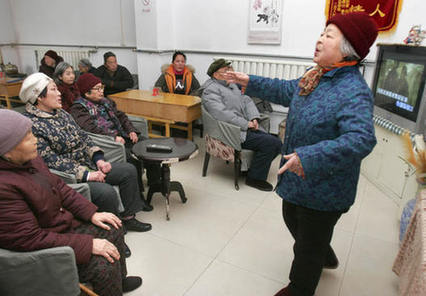| The Old Folks at Home
By staff reporter ZHAO DAN
THE afternoon sunlight streams into the room, with its neatly-made beds, exquisite teaware set, an up-to-the minute TV, and old family photos bedecking the walls of this cozy abode in the Silver Age Apartments for Senior Citizens. This is the home of 85-year-old Shu Hongjun and his wife Li Shizhen, three years his junior.
 |
|
A glee club at Golden Old Age Old Folks Home in Luoyang, Henan Province. |
Evolving Concepts of Elderly Care
The couple moved to the old folks home in 2007, at the "very filial" suggestion of their daughter. Although the couple's gown-up children lived in Beijing, they were too far away not to worry about their parents, living alone with no one on the spot to look out for them.
"I passed out twice at home, which put my wife in a spin," recalls Shu Hongjun. "We are old now and our memories are failing; if we have to go out buying groceries there's a good chance of having an accident." Experiences like this made them decide on the move to an old folks home. In July 2007, they rented out their own place and went to live in the Silver Age Apartments near to where their daughter lives.
"The medical service here is good and it's great to live together with other old people," says the old lady, pointing to the emergency beeper on the bed head. "There's another beeper in the bathroom for us to summon emergency help, and a doctor or nurse will arrive at the double."
When they themselves were younger, the couple looked after Shu's father until he passed away. "But there wasn't as much pressure from work and life back then. Things are very different for young people these days, what with just having one kid, and loads of pressure from all directions. Living here will make things less stressful for our children," Li explains.
Her husband expounds on why this lifestyle suits them: "One, my daughter feels she's doing her filial duty; two, we get all-round care; three, it stacks up financially."
The couple lives in a large standard room with two beds, each bed costing 2,300 yuan per month. When board, service and heating expenses are taken into account, it comes to 7,000 yuan per month, a sum that their pensions can adequately cover.
"Nowadays it is not easy to find good live-in help. Even when there are, the turnover is high, unless the two sides have developed a kind of family-like relationship," says Li. "At my age, it's far too much trouble to think about hunting for reliable domestic help. It's way easier to live in this kind of place."
Ma Jili, executive deputy director of Silver Age Apartments for Senior Citizens, explained something about the demographic: most of his elderly residents have a pension or rental incomes while some are funded by their children working overseas; the average age is 84; 70 percent of them have received higher education; one third of them were teachers – high school teachers for the most part. The Shu couple are university graduates. "Maybe well-educated people are more receptive to the idea of this lifestyle," muses Li.
| 